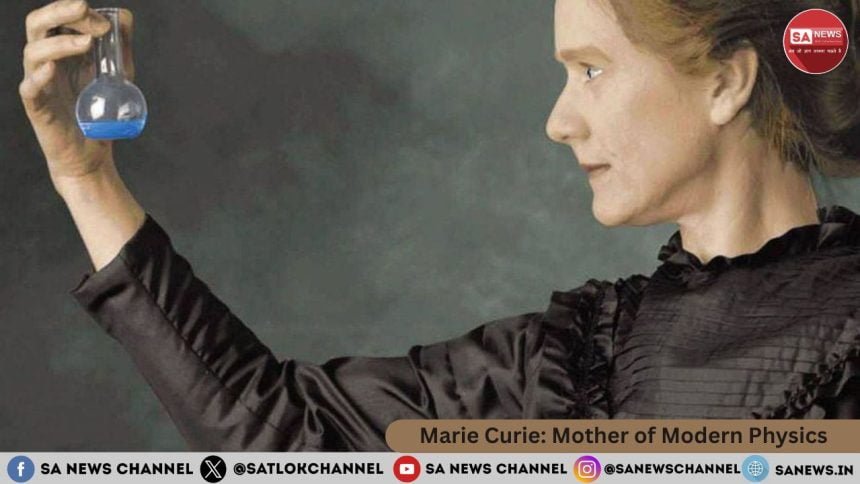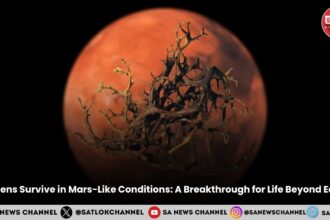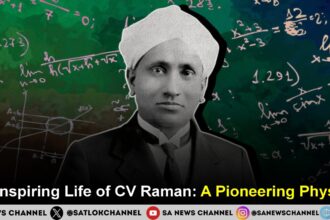“November 7, 1867, Warsaw, Poland – Maria Skłodowska was born into a world that denied women equality, but her innate curiosity and determination would defy conventions. Little did the world know, this young girl would illuminate the universe’s secrets, leaving an indelible mark on human history.
- Marie Curie’s Life and Work: Key Points
- Education and Family life of Marie Curie
- Marie Curie’s Life after Marriage
- Pioneering Discoveries and facts related to Marie Curie
- Marie Curie’s Generosity and Scientific Legacy
- Prizes and Acclaim
- Other awards :
- Ups and downs in Marie Curie’s life
- Indomitable Mindset was her win
- Radiation exposure became the cause of her death
- Motivational quotes given by Marie Curie
- Less Known Facts About Marie Curie
- Marie Curie was an Atheist
- Connect With Us on the Following Social Media Platforms
“The biography of Marie Curie is the inspiration for the generations, here you will explore the inspirational journey of Marie Curie and her pioneering contributions in the fields of physics and chemistry, which earned her the title of the “Mother of Modern Physics. Despite so many difficulties, she kept pushing herself for the sake of humankind till her final breath but ultimately did least or nothing for her soul and body.
Marie Curie’s Life and Work: Key Points
- Marie Curie The Mother of Physics
- Family, Early life and Education
- Her Married Life Journey.
- Pioneering Discoveries
- Marie Curie’s discoveries and facts
- Marie Curie’s Generosity and Scientific Legacy
- Prizes and Acclaim
- Ups and downs in Marie Curie’s life
- Indomitable Mindset
- Radiation exposure became the cause of death
- Marie Curie was an atheist
Education and Family life of Marie Curie
Famous scientist of history Marie Curie was born on November 7, 1867, in Warsaw, Poland, under the Russian Empire. Her father Vladislav was a physics-mathematics instructor as well as the director of two high schools. Both of her parents were teachers because of that she got to learn a lot from them. She received her primary education from a local boarding school. She was very much interested in science during her education.
Marie’s parents valued education and encouraged her and her siblings to learn and pursue their interests. Growing up in a family of educators, Marie was exposed to a stimulating intellectual environment from an early age. Her parents’ influence and support played a significant role in shaping her curiosity, work ethics, and passion for learning, which ultimately contributed to her remarkable achievements in science.
Marie’s early exposure to science and mathematics, particularly through her father’s influence, helped lay the foundation for her future success in these fields. Her parents’ emphasis on education and their teaching backgrounds likely instilled in Marie a strong appreciation for the value of knowledge and the importance of lifelong learning. She struggled to find education opportunities in Poland for higher studies due to gender bias and finally moved to Paris in 1891 for further education at Sorbonne, where she academically progressed.
Marie Curie’s Life after Marriage
Marie Curie started working in Paris, where she met Pierre Curie. Both fell in love with each other and later got married. She then continued working with her husband and showed great passion for radioactivity studies. They both started their research together, and their collaboration proved effective as they brought important things to light like the discovery concerning the isolation of radioactive isotopes and the identification of new elements, like radium and polonium.
The radioactivity research that Marie and Pierre Curie conducted made them receive accolades worldwide. Marie gave birth to two daughters in 1894 and 1904. But unfortunately, in 1906, Marie’s husband Pierre Curie died and this shook her soul.
Pioneering Discoveries and facts related to Marie Curie
1. Marie Curie started research with Pierre which made them discover polonium and radium in 1898. She observed that these radioactive elements release a lot of energy. This discovery was a major contribution to the field of Nuclear physics.
2. Marie discovered the use of X-rays in the medical field, and at the time of the 1st World War the development of mobile X-ray units helped a lot in the treatment of the injured soldiers.
3. First Female Professor at the Sorbonne: Marie Curie was the first female to become a professor at the University of Paris where she spent much of her time teaching and conducting research.
4. First Woman in Europe to Obtain PhD in Science: Marie Curie was the first woman in Europe to obtain a PhD in any area of research science, marking a significant achievement in the male-dominated society.
Marie Curie’s Generosity and Scientific Legacy
Oceano-hearted, her generosity can be measured by the selfless contributions and actions she made. Right after, she was awarded her first Nobel Prize in Physics in 1903, Marie Curie donated much of her prize money for the advancement of fellow scientists and opened many labs that are today beacons of scientific progress, like the famous Curie Institutes in both Paris and Warsaw, which continue to be at the forefront of research in physics, chemistry, and medicine.
■ Also Read: The Cosmic Genius: Albert Einstein’s Journey & Biography
Further, she never patented her discovery of radioactivity but rather denied herself financial benefit by keeping it open for the greater good of humanity and science. Albert Einstein once said about Marie that “Marie Curie is, of all celebrated beings, the only one whose fame has not been corrupted.”
Prizes and Acclaim
1. Nobel Prize in Physics (1903): She won the Nobel Prize in Physics in 1903, and was given jointly with Pierre Curie (her husband) and Henri Becquerel for their work in radioactivity.
2. Nobel Prize in Chemistry (1911): It was given in recognition of her discovery in Chemistry in 1911 for the isolation of a pure form of radium, which was isolated from pitch blende, and also for isolating polonium, isolated from pitch blende.
Other awards :
1. Matteucci Medal (1904): Presented by the Accademia Nazionale Delle Scienze in Italy in recognition of her contributions to the field of physics.
2. Elliott Cresson Medal (1921): Awarded by the Franklin Institute in Philadelphia for her exceptional achievements in chemistry.
Ups and downs in Marie Curie’s life
- Economic hardship: Marie Curie’s life was very painful from childhood. Her father was also a social activist from Poland and the Russian authorities expelled him from his job. Due to this, his family’s livelihood started going through a crisis. There was a time when Marie’s family members had to face difficulty in having one meal a day. After Marie’s mother’s demise, her elder sister Zofia also died from an illness. Due to all these incidents, Marie moved towards atheism.
- Academic opportunities – Marie Curie faced a lack of academic opportunities as most institutions of that time were quite reluctant to accept women for scientific studies.
- Tragic death of her husband- In 1906, Pierre Curie died due to a street accident in Paris. He slipped and fell in front of one moving heavy horse-drawn cart that ran over him. The tragedy happened close to the Sorbonne where both Pierre and Marie were working.
- Losing her mother at a young age – She was very young when she lost her mother which had a great impact on her life.
Indomitable Mindset was her win
What makes Marie Curie extraordinary beyond scientific genius is a never-back-down attitude. Hers was a life riddled with personal tragedies but she moved relentlessly on. Her legacy continues to inspire scientists and promote gender equality in STEM fields worldwide.
Radiation exposure became the cause of her death
Marie Curie’s dedication to science and her groundbreaking work with radioactive materials ultimately took a toll on her health. Her prolonged exposure to radiation led to the development of aplastic anaemia, a condition that was likely responsible for her premature death at the age of 66.
Marie Curie’s death on July 4, 1934, was a tragic consequence of her pioneering work, which paved the way for significant advancements in medicine, energy, and scientific understanding. Her legacy continues to inspire generations of scientists, researchers, and women in STEM fields.
It’s worth noting that Marie Curie’s death was a direct result of her prolonged exposure to radioactive materials, which was not well understood at the time. Today, scientists take much greater precautions when working with radioactive materials, and the risks associated with radiation exposure are much better understood.
Motivational quotes given by Marie Curie
- “Science knows no country because knowledge belongs to humanity.”
- “Nothing in life is to be feared, it is only to be understood.”
- “Be less curious about people and more curious about ideas.”
- “I was taught that the way of progress is neither swift nor easy.”
- “One never notices what has been done; one can only see what remains to be done.”
Less Known Facts About Marie Curie
1. Radiation Precautions: Even her cookbooks and research papers were highly radioactive, which made it important to preserve them in lead-lined containers and use protection with protective clothing when handling them.
2. No Patent on Radioactivity: Marie Curie refused to patent the discovery of radioactivity, to keep it open for other researchers.
3. Another Nobel Prize in the Family: Irène Joliot-Curie (Daughter of Marie Curie) received the Nobel Prize in Chemistry in 1935 for the artificial production of radioactive elements.
4. War Efforts: During World War I, Marie Curie made mobile X-ray units (Petites Curies) which helped the surgeons in the treatment of wounded soldiers on the battlefields.
5. 1st Female Professor: Marie Curie was appointed to the position of professor by the University of Paris in 1906, marking the first time that a woman had held this position in that bastion of male-dominated academia.
6. After Pierre’s tragic death in 1906, Marie continued their research and became a prominent figure in the scientific community. She founded the Curie Institutes in Paris and Warsaw, which remain major centres for medical research today.
Marie’s achievements extended beyond science. She was a devoted mother and mentor, and she supported women’s education and equality. She also developed mobile radiography units during World War I, helping wounded soldiers and paving the way for modern medical imaging techniques.
Marie Curie was an Atheist
She was born and brought up in a family that valued science and reason, and her own scientific work and discoveries led her to question religious beliefs. While she was born into a Catholic family, she eventually abandoned her religious faith and identified as an atheist. Her atheism was also influenced by her husband Pierre Curie and his untimely death.
Despite her atheism, Marie Curie was known for her strong sense of morality, compassion, and social responsibility. She was a devoted mother, a dedicated scientist, and a passionate advocate for women’s rights and education. Her legacy extends far beyond her scientific achievements, inspiring generations to pursue their passions and make a positive impact on the world.
Atheists, the most other rationalists like scientists, researchers, explorers can’t explain their own existence; and all the scientists of the world still don’t have any answer to this basic question, “what puts life into the cell in the mother’s womb that leads to the formation of human body?” which is worth keeping in mind. Read the full article on atheism on jagatguruRampalji.org
By embracing the teachings of our holy texts and receiving initiation from a Tatvdarshi/Complete Saint, one can embark on a transformative journey of self-realization and spiritual growth. This path leads to the ultimate freedom, transcending the bounds of karma and the cycle of rebirth.
Through devotion, discipline, and the guidance of an Enlightened Saint, one can experience the bliss of true salvation, realizing their true nature and reunifying with the divine. Let us seek this profound liberation, following the timeless wisdom of our scriptures and the compassionate Leadership of Saint Rampal Ji.”









